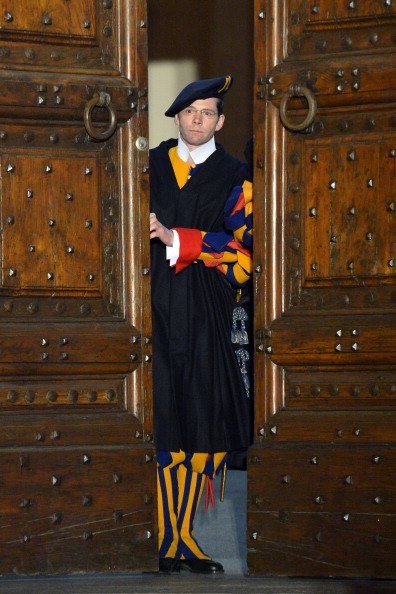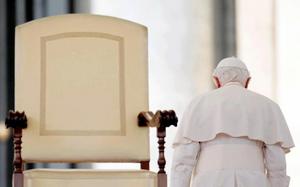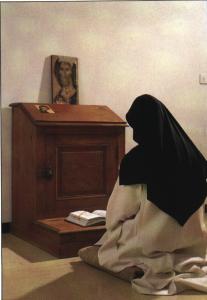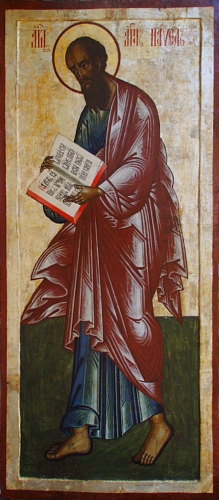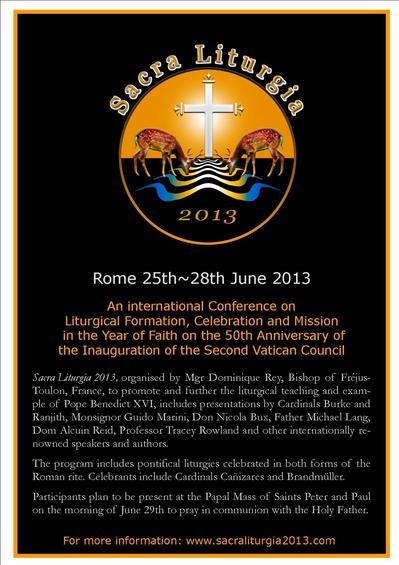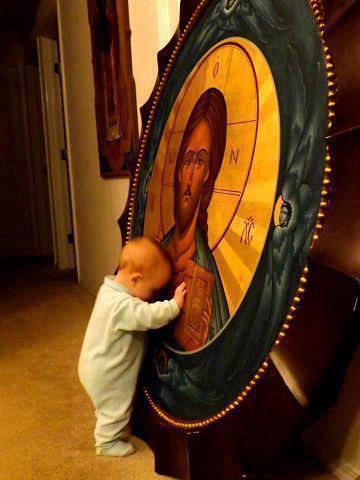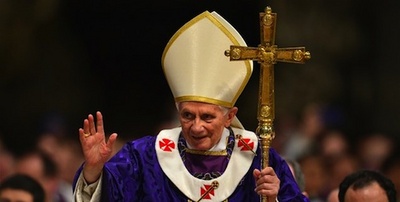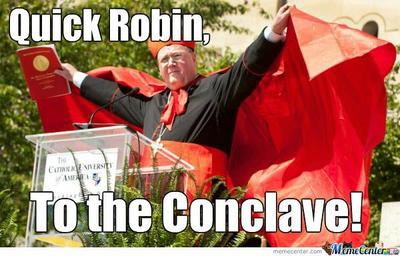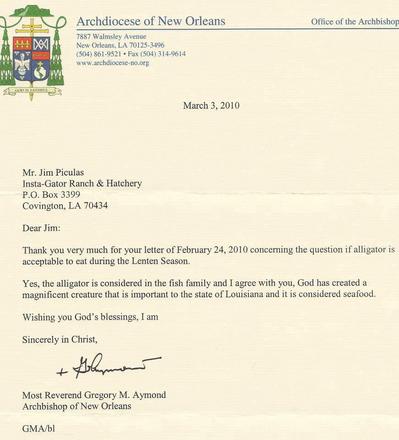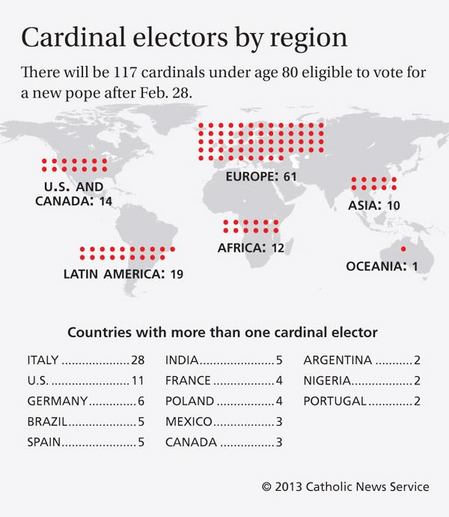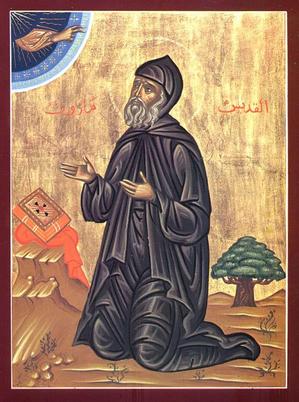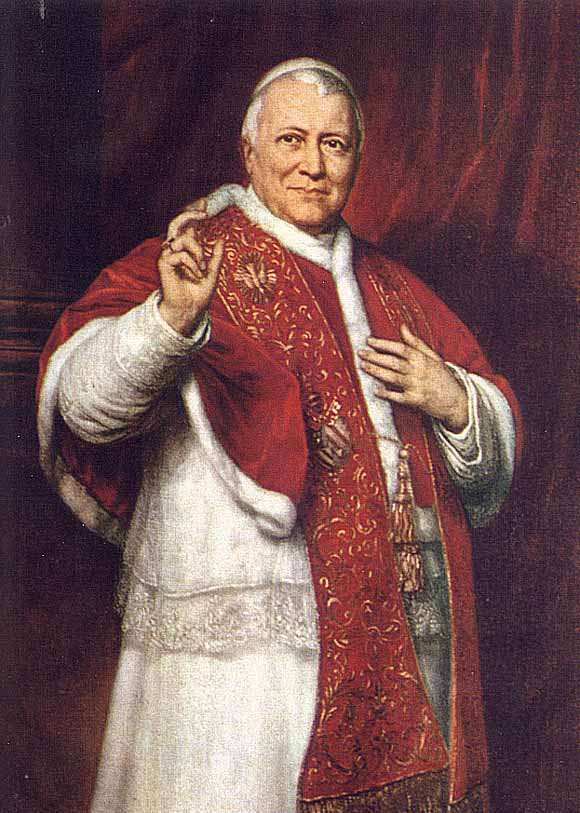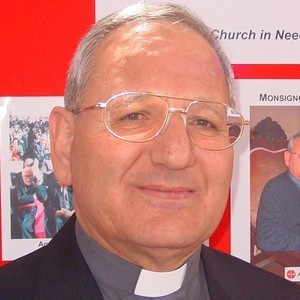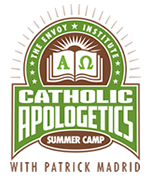 The 4th Annual Catholic Apologetics Camp is planned for the summer of 2013, August 8-14. The Envoy Institute under the direction of Patrick Madrid, is doing the programing.
The 4th Annual Catholic Apologetics Camp is planned for the summer of 2013, August 8-14. The Envoy Institute under the direction of Patrick Madrid, is doing the programing.February 2013 Archives
 The 4th Annual Catholic Apologetics Camp is planned for the summer of 2013, August 8-14. The Envoy Institute under the direction of Patrick Madrid, is doing the programing.
The 4th Annual Catholic Apologetics Camp is planned for the summer of 2013, August 8-14. The Envoy Institute under the direction of Patrick Madrid, is doing the programing.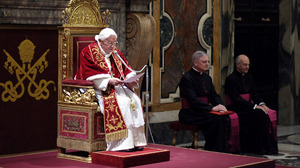
I welcome you all with great joy and cordially greet each one of you. I thank Cardinal Angelo Sodano, who as always, has been able to convey the sentiments of the College, Cor ad cor loquitur. Thank you, Your Eminence, from my heart.
And referring to the disciples of Emmaus, I would like to say to you all that it has also been a joy for me to walk with you over the years in light of the presence of the Risen Lord. As I said yesterday, in front of thousands of people who filled St. Peter's Square, your closeness, your advice, have been a great help to me in my ministry. In these 8 years we have experienced in faith beautiful moments of radiant light in the Churches' journey along with times when clouds have darkened the sky. We have tried to serve Christ and his Church with deep and total love which is the soul of our ministry. We have gifted hope that comes from Christ alone, and which alone can illuminate our path. Together we can thank the Lord who has helped us grow in communion, to pray to together, to help you to continue to grow in this deep unity so that the College of Cardinals is like an orchestra, where diversity, an expression of the universal Church, always contributes to a superior harmony of concord. I would like to leave you with a simple thought that is close to my heart, a thought on the Church, Her mystery, which is for all of us, we can say, the reason and the passion of our lives. I am helped by an expression of Romano Guardini's, written in the year in which the Fathers of the Second Vatican Council approved the Constitution Lumen Gentium, his last with a personal dedication to me, so the words of this book are particularly dear to me .
Vatican City, 25 February 2013 (VIS) - Cardinal Secretary of State Tarcisio Bertone SDB, sent a letter to the monasteries devoted to contemplative life around the world, inviting them to intensify their prayers at this special moment in the life of the Church. Following is the entire text of the message that is dated 21 February.
"I write to you as the whole Church anxiously follows the final days of the luminous pontificate of His Holiness Benedict XVI and awaits the arrival of the successor whom the Cardinals gathered in conclave and guided by the Holy Spirit will choose, after discerning together the signs of the times of the Church and the world.
"His Holiness Benedict XVI has asked all the faithful to accompany him with their prayers as he commends the Petrine ministry into the Lord's hands, and to await with trust the arrival of the new Pope. In a particularly urgent way this appeal is addressed to those chosen members of the Church who are contemplatives. The Holy Father is certain that you, in your monasteries and convents throughout the world, will provide the precious resource of that prayerful faith which down the centuries has accompanied and sustained the Church along her pilgrim path. The coming conclave will thus depend in a special way on the transparent purity of your prayer and worship.
"The most significant example of this spiritual elevation which manifests the most authentic and profound dimension of every ecclesial action, the presence of the Holy Spirit who guides the Church, is offered to us by His Holiness Benedict XVI who, after having steered the barque of Peter amid the waves of history, has chosen to devote himself above all to prayer, contemplation and reflection.
"The Holy Father, with whom I shared the contents of this letter, was deeply appreciative, and asked me to thank you and to assure you of his immense love and esteem.
"With affection in Christ I send you greetings, united with you in prayer."
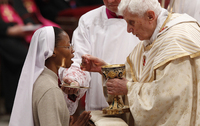
There are few opportunities for good and solid learning on the sacred Liturgy these days. Many of the conferences that pass for the advancement of Catholic thinking on the Liturgy are ideological. BUT, the forthcoming conference in Rome, Sacra Liturgia 2013, provides a great venue, a a clear context, a group of well-informed speakers dealing with the Catholic worship of the One Triune God.
Recently, a member of the Catholic World Report interviews one of the organizers, Dom Alcuin Reid, of Sacra Liturgia 2013 which will take place 25-28 June.
Dom Alcuin answers a question on Pope Benedict's contribution to liturgical life of the Church:
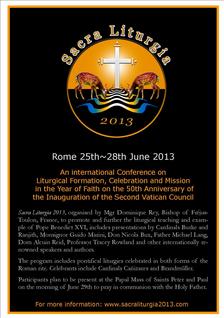
Primarily in fostering the "new liturgical movement," I think. Firstly, by his teaching, above all in Sacramentum Caritatis, which is a profound tutorial on the liturgical and ecclesial celebration of the Blessed Eucharist. Also by his acts, most certainly through Summorum Pontificum, where he authoritatively asserted that that the rites that were once "sacred and great...cannot be all of a sudden entirely forbidden or considered harmful." Finally, by his example: papal liturgies have shown us the meaning of ars celebrandi--the manner of celebrating the sacred mysteries with a true noble simplicity. And always, at the head of these liturgies has stood a man who has looked together with us toward the cross he had placed in the center of the altar. The liturgy is about Him, not me, he has taught us.
Clergy, religious and laity are welcome!
Dom Alcuin Reid is a monk of the Monastère Saint-Benoît in the Diocese of Fréjus-Toulon, France.
Reid's major work, The Organic Development of the Liturgy (Ignatius Press, 2005); he updated The Ceremonies of the Roman Rite Described (Burns & Oates, 2009) and he is the editor of From Eucharistic Adoration to Evangelization (Burns & Oates, 2012).
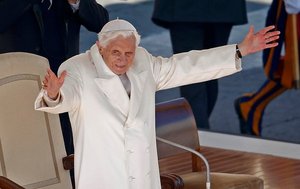
I offer a warm and affectionate greeting to the English-speaking pilgrims and visitors who have joined me for this, my last General Audience. Like Saint Paul, whose words we heard earlier, my heart is filled with thanksgiving to God who ever watches over his Church and her growth in faith and love, and I embrace all of you with joy and gratitude. During this Year of Faith, we have been called to renew our joyful trust in the Lord's presence in our lives and in the life of the Church. I am personally grateful for his unfailing love and guidance in the eight years since I accepted his call to serve as the Successor of Peter. I am also deeply grateful for the understanding, support and prayers of so many of you, not only here in Rome, but also throughout the world. The decision I have made, after much prayer, is the fruit of a serene trust in God's will and a deep love of Christ's Church. I will continue to accompany the Church with my prayers, and I ask each of you to pray for me and for the new Pope. In union with Mary and all the saints, let us entrust ourselves in faith and hope to God, who continues to watch over our lives and to guide the journey of the Church and our world along the paths of history. I commend all of you, with great affection, to his loving care, asking him to strengthen you in the hope which opens our hearts to the fullness of life that he alone can give. To you and your families, I impart my blessing. Thank you!
Thank you for coming in such large numbers to this last General Audience of my pontificate.
Like the Apostle Paul in the biblical text that we have heard, I feel in my heart the paramount duty to thank God, who guides the Church and makes her grow: who sows His Word and thus nourishes the faith in His people. At this moment my spirit reaches out to embrace the whole Church throughout the world, and I thank God for the "news" that in these years of Petrine ministry I have been able to receive regarding the faith in the Lord Jesus Christ, and the charity that circulates in the body of the Church - charity that makes the Church to live in love - and of the hope that opens for us the way towards the fullness of life, and directs us towards the heavenly homeland.
I feel I [ought to] carry everyone in prayer, in a present that is God's, where I recall every meeting, every voyage, every pastoral visit. I gather everyone and every thing in prayerful recollection, in order to entrust them to the Lord: in order that we might have full knowledge of His will, with every wisdom and spiritual understanding, and in order that we might comport ourselves in a manner that is worthy of Him, of His, bearing fruit in every good work (cf. Col 1:9-10).
The violence in Syria doesn't seem to end, the dignity persons disrespected. Recent terrorist explosions in Damascus' Mazraa district left 53 dead and 235 injured and caused extensive damage, particularly to a school and a hospital.
Melkite Patriarch Gregory III issued a statement on February 21st. I recommend to your prayers His Beatitude's intentions and leadership, and to work for peace in your own particular context.
He calls for an end of providing weapons to the warring factions.
Read the full Statement of Patriarch Gregory 21 February 2013.pdf
In short he said,
- We extend our appeal to Russia and the United States of America to continue their sincere efforts to support progress towards dialogue and a comprehensive political solution. The patience of Syrians is exhausted: their suffering is exacerbated in every detail of their daily life.
- We ask His Holiness the Pope and leaders of the Holy Apostolic See of Rome to launch a diplomatic initiative of the Catholic Church based on its global spiritual influence.
- We turn once more especially to our faithful of the Patriarchal Eparchy of Damascus, inviting them to fast and pray during this period of Great Lent for security and peace in Syria and for the success of efforts for dialogue and reconciliation.
The Prefect of the Congregation for the Doctrine of the Faith, Archbishop Gerhard L. Müller, addressed the Pontifical Academy of Life on 22 February 2013. It was the annual meeting in Rome. Müller's talk didn't shatter too many windows by unearthing new problems, nor did it break new ground in the Church's teaching. Müller gives a brief assessment of the situation and that we have gone off the tracks in some ways. He does, however, shed light on the fact that we need to take more seriously our moral and faith formation and to put in the time doing the hard work to know the issues and how to respond to them according the parameters of the Catholic Faith. Too often we are afraid to do the hard work. And that's the ministry of the Prefect: to illumine and offer a corrective. Archbishop Müller did challenge, to a degree, the theological professorial establishment, even if the talk may be seen a bit anemic.
The full text: Gerhard Müller Human Life in Some Documents of the Magisterium.pdf
According to the Vatican Information Service, quoting the Holy See spokesman, Jesuit Father Frederico Lombardi, in a press conference, made some details public today regarding His Holiness. In sum, he said that Pope Benedict XVI:
- will be referred to as "Pope Emeritus" or "Pontiff Emeritus";
- will keep the style "His Holiness, Benedict XVI";
- will keep wearing a simple white cassock without the papal mozzetta; and
- that the fisherman's ring, and the lead seal, will be broken.
Benedict is scheduled to arrive in Castel Gandolfo on 28 February, at 5:15pm -Rome time. At 8pm, Rome time), when the See of Peter goes vacant, the Swiss Guard will quietly leave the papal summer residence; the Guard's services of protection are limited to the person of the Pontiff; the security of the "Pope Emeritus" will be assured by the Vatican Gendarmerie.
As commentary, some opined that the papal ring could be given to the Vatican Museum but the decision was made to continue to break the break to show the end of this papal reign. Perhaps the broken ring will be given to the Museum if it is not crushed beyond recognition.
It seems to me that in Benedict's case, he ought to be readmitted to the College of Cardinals, be known as His Eminence, Joseph Cardinal Ratzinger, Bishop-emeritus of Rome. Moreover, he ought to adopt the clothes of a cardinal and be given the titular church of Sant'Anselmo or Santa Maria in Trastevere. I'd like him to be given the Benedictine Church of Sant'Anselmo!
In 1936, the King of England, Edward VIII, abdicated, he was first known as HRH Prince Edward, and then, HRH the Duke of Windsor.
Recently, Her Majesty Queen Beatrix of the Netherlands announced that she was abdicating throne on 30 April. Thereafter Beatrix will be known as Her Royal Highness, Princess Beatrix. You can only have on monarch at a time.
Roma locuta, causa finita.
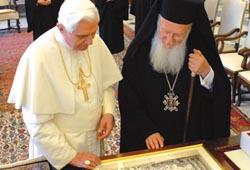
The Patriarch of Constantinople, Bartholomew I, wrote a letter on occasion of the abdication of Pope Benedict. It is a warm letter and testimony to his co-worker in the vineyard. In an era of lots of change in the leadership of many changes, it is interesting to what is said,
It is with regret that we have learned of the decision by His Holiness Pope Benedict to retire from his Throne, because with his wisdom and experience he could have provided much more to the Church and the world.
Pope Benedict leaves an indelible mark on the life and history of the Roman Catholic Church, sealed not only by his brief papacy, but also by his broad and longstanding contribution as a theologian and hierarch of his Church, as well as his universally acknowledged prestige.
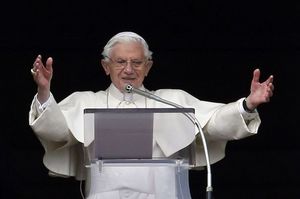
This is Pope Benedict's final Angelus address as the Supreme Pontiff of the one, holy, catholic and apostolic Church. Notice the imagery he uses: the climbing the mountain and "once you've met Christ, why come down to pain?" The Pope has a new vocation: to live in adoration of Christ.
On the second Sunday of Lent, the liturgy always presents us with the Gospel of the Transfiguration of the Lord. The evangelist Luke places particular emphasis on the fact that Jesus was transfigured as he prayed: his is a profound experience of relationship with the Father during a sort of spiritual retreat that Jesus lives on a high mountain in the company of Peter, James and John , the three disciples always present in moments of divine manifestation of the Master (Luke 5:10, 8.51, 9.28).
The Lord, who shortly before had foretold his death and resurrection (9:22), offers his disciples a foretaste of his glory. And even in the Transfiguration, as in baptism, we hear the voice of the Heavenly Father, "This is my Son, the Chosen One listen to him" (9:35). The presence of Moses and Elijah, representing the Law and the Prophets of the Old Covenant, it is highly significant: the whole history of the Alliance is focused on Him, the Christ, who accomplishes a new "exodus" (9:31) , not to the promised land as in the time of Moses, but to Heaven. Peter's words: "Master, it is good that we are here" (9.33) represents the impossible attempt to stop this mystical experience. St. Augustine says: "[Peter] ... on the mountain ... had Christ as the food of the soul. Why should he come down to return to the labors and pains, while up there he was full of feelings of holy love for God that inspired in him a holy conduct? "(Sermon 78.3).
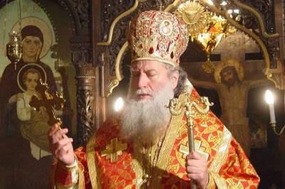 The Bulgarian Orthodox Church elected today Metropolitan Neofit, 67, as the new patriarch. He succeeds Patriarch Maxim who at 98, died on November 6, 2012. He had served the Church since 1971.
The Bulgarian Orthodox Church elected today Metropolitan Neofit, 67, as the new patriarch. He succeeds Patriarch Maxim who at 98, died on November 6, 2012. He had served the Church since 1971.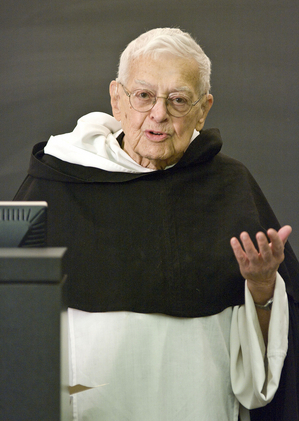 Word received this evening that the venerable theologian and priest, Father Benedict Ashley, OP, 97, died today. Father Benedict was a teacher of mine when I was in St Louis.
Word received this evening that the venerable theologian and priest, Father Benedict Ashley, OP, 97, died today. Father Benedict was a teacher of mine when I was in St Louis.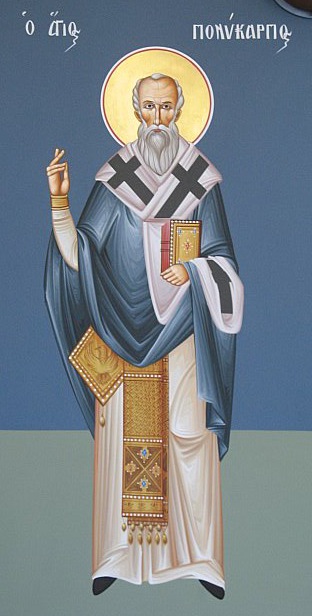
Saint Polycarp's rich writings point to one thing: a sharp focus on Jesus Christ as the only thing we ought to be concerned with today. Nothing else really matters....
Polycarp (AD 69-155) was a bishop of Smyrna and martyr of the Church. He was a disciple of the Beloved Disciple John who ordained him a bishop. Polycarp's life and work are attested to by Irenaeus, Tertullian and Jerome. He is called an Apostolic Father along with Saint Clement of Rome and Saint Ignatius of Antioch.
Saint Polycarp's witness is key in knowing the early Church's life and how we work in building up the Kingdom today. The saint was instrumental in bring others to Christ.
This excerpt tells us of his call to greater conversion in the Lord.
"... if we do His will and walk in His commandments and love the things which He loved, abstaining from all unrighteousness, covetousness, love of money, evil speaking, false witness; not rendering evil for evil or railing for railing or blow for blow or cursing for cursing; but remembering the words which the Lord spake as He taught; Judge not that ye be not judged. Forgive, and it shall be forgiven to you. Have mercy that ye may receive mercy. With what measure ye mete, it shall be measured to you again; and again Blessed are the poor and they that are persecuted for righteousness' sake, for theirs is the kingdom of God."
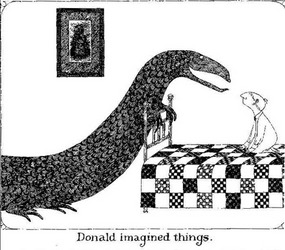 Edward Gorey would have been 88 today had he lived; Gorey died in 2000.
Edward Gorey would have been 88 today had he lived; Gorey died in 2000.With the Church we pray
Grant, we pray, almighty God, that no tempests may disturb us, for you have set us fast on the rock of the Apostle Peter's confession of faith.
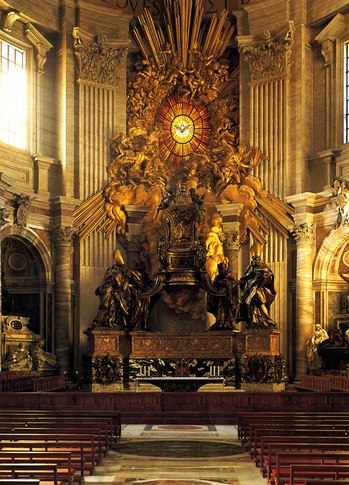
Has anyone promised you anything? As Catholics, we can say with certainty that we have been promised something. In fact, we are promised not only something, but Someone. We can identify that we have been promised the truth, happiness (in this life) and eternal life (happiness in the next life); we've also been promised a rich relationship with God, with Jesus, and the Holy Spirit. Today's feast of the Chair of Saint Peter is the Church's way of reminding God and each other that we have been promised all these things: truth, happiness, and life eternal with God.
For a very, very long time, actually since the 4th century, the Church of Rome has had a special commemoration of the pastoral, spiritual authority of Saint Peter as the rock upon which the Lord built His Church. Historians estimate that Saint Peter was executed between the years 64 and 68. In fact, the Church in Antioch, founded by Saint Peter, has also had this feast on their liturgical calendar. The witnesses found in the Apostolic Fathers, the Roman See has always held a special place in the obedience of orthodox Christian believers because of the bishop of Rome "presides in love" and in service over all the Churches of God.
Today's feast ought to remind each one of us that we don't celebrate furniture but it calls us to see in Peter Jesus. Each feast of a saint, including the Blessed Mother, always points to Jesus. To do otherwise would be idolatry. The Chair of Saint Peter is fundamentally about work, the mission of bishop as overseer, teacher and pastor conferred by Jesus on Peter, and continued through the ages to Pope Benedict XVI (and soon on his successor). See the Gospel of Matthew 16:13-20. What we celebrate today is the communion of faith, the truth of the faith given to us by the Lord through the apostles to the bishop of Rome and to all bishops. You may even say the feast we celebrate today is the ministry of the Church's Magisterium located in the Roman Pontiff in that he cannot teach error. That does not mean the pope is a saint; that the pope does not sin; on contrary, we believe the pope is a sinner and in need of redemption like each one of us: he has clay feet like you and me. But having clay feet doesn't mean that teach that we believe in "Christ, the Son of the Living God." His job is to help us see the face of Christ in this world, and to lead us to Him so that may enjoy eternity with Him.
In 2006, Benedict XVI gave the following address on this feast which is required reading,
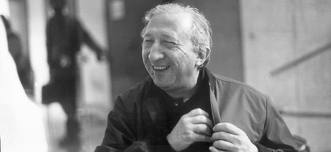 Today is the 8th anniversary of the death of Father Luigi Giussani. A perfect day, the feast of the Chair of Saint Peter. Perfect because of Giussani's and our total affection for and following of the magisterium of the Vicar of Christ. Giussani taught us to follow Jesus, and his ministers.
Today is the 8th anniversary of the death of Father Luigi Giussani. A perfect day, the feast of the Chair of Saint Peter. Perfect because of Giussani's and our total affection for and following of the magisterium of the Vicar of Christ. Giussani taught us to follow Jesus, and his ministers.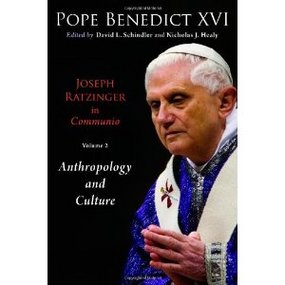
Book sales will no doubt sky rocket with Benedict's resignation next week. But this superficial reason won't hold those really interested in one of THE most pivotal thinkers of the Church in the 20th and 21st centuries when Volume 2, Joseph Ratzinger in Communio: Anthropology and Culture (Michigan/Cambridge, Wm. B. Eerdmans Publishing Co., 2013) is in the mailbox.
Joseph Ratzinger in Communio: Anthropology and Culture is edited by David L. Schindler and Nicholas J. Healy. The 14 texts herein address anthropological themes written by Joseph Ratzinger between 1972 and 2005. That Eerdmans is the publisher is a terrific help since their list is widely acclaimed and ecumenical.

There are missionary Benedictines who take the gospel on the road as it were. When you think of Benedictines you think of the monks and nuns praying the Divine Office, living a hidden life, even running schools, parishes, printing houses and making beer. But what we see is that most often Benedictines evangelize through their enduring presence in a given area and therefore don't move around the world as Dominicans, Franciscans or Jesuits do.
However, the Benedictine monks of the St Ottilien Congregation, based in Germany, have lived a missionary vocation since the founding in 1886 by Father Andreas Amrhein. Today this congregation of monks are on 5 continents in 20 countries.
The monks of Christ the King Priory lead a life of prayer and work. They have 9 monks who run the Saint Benedict Retreat Center, make an effort for fundraising for missionaries in the third world, and to help undocumented people integrate into the USA. The Priory's own video presentation is located here.
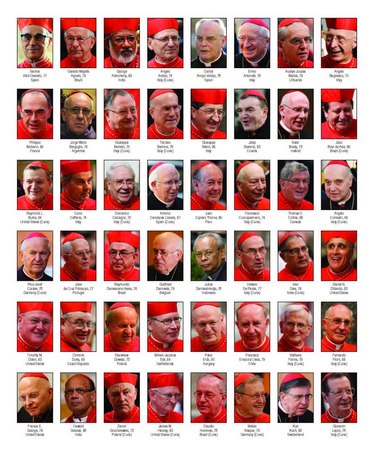
The USCCB published a handy yearbook "presentation of all 117 cardinals eligible to vote for a new pope in the upcoming conclave. The electors are presented in alphabetical order by last name. Their age as of Feb. 28 and country of origin are also given. Also noted are those who are current members of the Roman Curia. The file contains three pages. (CNS graphic/Paul Haring and Nancy Phelan Wiechec)"
One hears that the Indonesian cardinal, Jesuit Julius Darmaatmadja, 78, the archbishop emeritus of Jakarta, will not be attending due to health issues. He's been dealing with eye problems for years and likely has other serious health concerns. There's a lot of people talking --though it doesn't mean too much now-- about Cardinal Roger Mahoney's presence at the conclave. For some, it is hoped that his conscience will tell him not to go to Rome. We'll see.
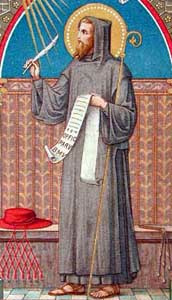
Saint Peter Damian is most known as the 11th century-Ravenna-born-monk and author. Peter was, in fact, a hermit. He was keen on the rights of the Church but also with the personal renewal and reform (i.e., conversion) as being an authentic witness to the gospel. The the primacy of discipleship with Christ as Lord and Savior was key. He was a Doctor of the Church.
In 2007, Pope Benedict dedicated a letter to the religious superior of the Monastery of San Gregorio al Celio, Father Guido Gargano on the 1000th anniversary of Saint Peter Damian's birth. Read it here.
With Pope Benedict's impending renouncing of the Peterine ministry, one can't help but thinking that Saint Peter Damian is a personal model for Benedict's forthcoming monastic retreat.
With the Church we pray,
Grant, we pray, almighty God,that we may so follow the teaching and example of the Bishop Saint Peter Damian, that, putting nothing before Christ and always ardent in the service of your Church, we may be led to the joys of eternal light.

The World Youth Alliance will be hosting the Manhattan International Film Festival on Friday, February 22 - Sunday, February 24, 2013.
The WYA's Manhattan International Film Festival views short films by young directors from around the world, including Macedonia, Australia, Portugal, Italy, Philippines, Taiwan, Malaysia, and the United States.
The festival will feature presentations and screenings by renowned award-winning independent filmmaker, Jamil Dehlavi, and Director of Film and Animation at School of Visual Arts, Salvatore Petrosino.
All festival events are free admission and open to the public.
A complete schedule is now available online and can be viewed here.
During this time of Lent each one is to received a book from the library, and is to read the whole of it straight through. These books are to be distributed at the beginning of Lent (RB 48:15, 16)
This portion of the Rule of Saint Benedict gives a real good sense of what monks, nuns, sisters and oblates practice during Lent: they savor the good Word, they taste the wisdom of those seeking God. Reading is very important to Saint Benedict, and to his spiritual children done through the ages. Reading enlivens the imagination and transforms the heart and informs one's behavior.
Lenten books are distributed to the members of a Benedictine community by the superior usually at "chapter meeting" just before Lent begins. Oblates ought to speak with their Oblate Director or their spiritual director for guidance. In most monasteries and in many of the Oblate programs there is a "Bona Opera" (Good Works) card that is filled out, given to the superior for approval. On the card one would name the book to be read.
To help make the Lenten experience of reading more profitable, Lenten reading may be a community exercise beginning shortly after supper until Compline. Or, you can adjust your schedule accordingly.
Pick a good spiritual book!
The experience of compunction is basically an experience of spiritual awakening. It provides the motivation for conversion to God, with the necessary rejection of sin and of whatever is less than the Creator.
The alternation of different experiences of compunction purifies the heart's self-centeredness and gradually configures it to the image and likeness of Christ the Lord. They can be easily interpreted as manifestations of the "good zeal" of Christ the Bridegroom.
He corrects and encourages us by means of his Word, which we confront in lectio divina. His Word acts like a mirror of what the person is and what he or she can become through divine grace. Christ, the Spouse of every Christian, is purifying those he loves so as to prepare them for deep fellowship with him in a single spirit.
The Sun at Midnight
Dom Bernardo Olivera, OCSO
We Catholics have confidence in the proper use of indulgences for flourishing of the spiritual life on earth and in purgatory. Indulgences are often more known in concept but not always with the needed exactitude with regard to the high religious ideals of theology and sacramentality in following Jesus Christ more closely in His Resurrection.
Catholics know that one of the conditions of gaining the gift of indulgence is prayer for the Pope's intentions. But when there is no pope, how does one fulfill the requirements of the indulgence? Are indulgences unavailable to the faithful during the papal vacancy?
The Apostolic Penitentiary answered this question in 2005 at the papal vacancy, stating that indulgences are still available to the faithful during the interregnum, since the "intentions of the Holy Father" perdure past the life of the same Holy Father, therefore prayer for those intentions made known by the Apostolic See remain necessary and efficacious for the purposes of indulgences.
I note the Pope's Intentions on the first day of the month here on the Communio blog, but the Apostleship of Prayer, whose ministry it is in the USA, makes these intentions available online and in a nicely printed pamphlet. The papal intentions for February 2013 are noted here.
In the text, The Gift of the Indulgence (2000), the Apostolic Penitentiary writes,
I am uncertain of the history of this prayer, but Saint Claude does a good job capturing the heart of the matter...
My God, I am so persuaded that You watch over all who hope in You and nothing can be lacking to those who await from You all things, that I have determined to live from now on without any concern, letting go and giving You all of my anxieties.
Indeed, "It would be foolish to act as if nothing happened" with the abdication of a pope, and much more since it was Benedict XVI. While I am not completely surprised by his gesture of love for the Church, I am saddened that he's exiting stage left because I have come to rely on him as a credible witness of how to live my Christian life with vigor.
Editorials are flying around faster than the wicked witch: some are very worth reading and some not. One would swear that the commentators have never read a word that Razinger wrote or truly observed a gesture of Benedict XVI. But won't realize this until you digest what's said.
Let me offer an editorial from La Repubblica (February 15, 2013) written by Father Julián Carrón, President of the Fraternity of Communion and Liberation. "Ratzinger's Cross" gives reasons of true Hope.
An excerpt...
What was capable of filling the entire world with silence, all of a sudden?
That astonished moment destroyed, in one stroke, the images that we normally have of Christianity: a past event, an earthly organization, a group of roles, a morality about things that we should or shouldn't do... No, all of this cannot give adequate reasons for what happened on February 11th. We must look elsewhere for the explanation.
Therefore, faced with the Pope's gesture, I wondered: Will anyone ask themselves who Christ is for Joseph Ratzinger, if the bond with Him led him to carry out an act of freedom this surprising, which everyone--believers or not--recognized as exceptional and profoundly human? Avoiding this question would leave the event without an explanation and, what is worse, we would miss the most precious part of what it witnesses to us. It cries out, in fact, just how real the person of Christ is in the life of the Pope, how much Christ must be contemporaneous and powerfully present in order for him to generate a gesture of freedom from everything and everyone, an unheard-of novelty, so impossible for man. Full of wonder, I was then forced to shift my gaze to what made it possible: Who are You, who fascinate a man to the point of making him so free that he provokes the desire for the same freedom in us, too? "Christ in His beauty draws me to Him," exclaimed another man passionate about Christ, Jacopone da Todi. I haven't found a better explanation.
Full text: Julián Carrón Ratzinger's Cross.pdf
Fridays are a great time to recommit oneself to the loving Heart of Jesus. It is our Catholic faith, and enduring tradition, to carry in our heart and mind that the reason for the Incarnation is the outpouring of Love by the Blessed Trinity for all humanity is real and beautiful. Several things to do: make an act of consecration to the Sacred Heart of Jesus once a month and pray the Daily Offering. The Apostleship of Prayer is a good Catholic work to follow in this regard. Moreover, praying for the needs of the Church and the Holy Father is part-and-parcel of being united to the Heart of Christ (the intentions are posted here on the first day of the month) and consecrating the home to the Sacred Heart of Jesus by enthroning the image of Christ in the home are fitting observances to build the Kingdom. You may also want to join the Confraternity of the Sacred Heart of Jesus.
I might add that reading Pope Benedict XVIs commemorative letter on the 50th anniversary of Haurietis Aquas is a good thing to do. The Servant of God Pope Pius XII wrote Haurietis Aquas, on the devotion to the Sacred Heart.
Prayer of Consecration the Sacred Heart of Jesus by Saint Margaret Mary Alacoque
I, ....., give myself to the Sacred Heart of our Lord Jesus Christ, and I consecrate to him my person and my life, my actions, pains, and sufferings, so that henceforth I shall be unwilling to make use of any part of my being except for the honor, love, and glory of the Sacred Heart.
My unchanging purpose is to be all his and to do all things for the love of him while renouncing with all my heart whatever is displeasing to him.
I take you, O Sacred Heart, as the only object of my love, the guardian of my life, the assurance of my salvation, the remedy of my weakness and inconstancy, the atonement for all my faults, and the sure refuge at my death. O Heart of goodness, be my justification before God the Father, and turn away from me the strokes of his righteous anger.
O Heart of love, I place all my trust In you, for I fear everything from my own wickedness and frailty, but I hope for all things from your goodness and bounty.
Consume in me all that can displease you or resist your holy Will. Let your pure love imprint you so deeply upon my heart that I shall nevermore be able to forget you or be separated from you. May I obtain from all your loving kindness the grace of having my name written in you, for I desire to place in you all my happiness and all my glory, living and dying in virtual bondage to you.

A pivotal saint for our time is the Jesuit Father Claude la Colombière (1641-82) known mostly for being spiritual director of Saint Margaret Mary. He died on the First Sunday of Lent.
Saint Claude was a great believer in Divine Providence, Love and Mercy as revealed by Christ Himself and pledged himself to this mission. Both of these saints were instrumental in the devotion to the Sacred Heart of Jesus. Father Claude was devoted to working with the poor.
It is said that the day after his death, Saint Margaret Mary received supernatural assurance that Father Claude needed no prayers, as he was in already heaven.
Pope John Paul II, during the canonization of Saint Claude said,
The past three centuries allow us to evaluate the importance of the message which was entrusted to Claude. In a period of contrasts between the fervor of some and the indifference or impiety of many, here is a devotion centered on the humility of Christ, on his presence, on his love of mercy and on forgiveness. Devotion to the Heart of Christ would be a source of balance and spiritual strengthening for Christian communities so often faced with increasing unbelief over the coming centuries.
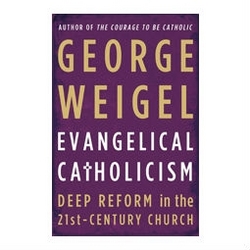 In today's mail I received my copy of George Weigel's latest book, Evangelical Catholicism: Deep Reform in the 21-Century Church (Basic Books, 2013).
In today's mail I received my copy of George Weigel's latest book, Evangelical Catholicism: Deep Reform in the 21-Century Church (Basic Books, 2013)."The internal dynamics of he Church itself, attentive tot eh promptings of the divine Bridegroom and the unique challenges posed to the Great Commission by late modernity and post-modernity, have, together, impelled a new evolution in the Church's self-understanding and self-expression. The result of that evolution, Evangelical Catholicism, is an expression of the four enduring marks of Christian ecclesial life --unity, holiness, catholicity, and apostolicity."
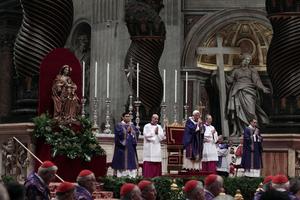
Today, Ash Wednesday, we begin a new Lenten journey, a journey that extends over forty days and leads us towards the joy of Easter, to victory of Life over death. Following the ancient Roman tradition of Lenten stations, we are gathered for the celebration of the Holy Eucharist. The tradition says that the first statio took place in the Basilica of Saint Sabina on the Aventine Hill. Circumstances suggested we gather in Saint Peter's Basilica. Tonight there are many of us gathered around the tomb of the Apostle Peter, to also ask him to pray for the path of the Church going forward at this particular moment in time, to renew our faith in the Supreme Pastor, Christ the Lord. For me it is also a good opportunity to thank everyone, especially the faithful of the Diocese of Rome, as I prepare to conclude the Petrine ministry, and I ask you for a special remembrance in your prayer.
When the Pope came into the Paul VI Hall he was greeted with lots of people which is typical, but there seemed to be more than c. 8000 people in attendance. The outpouring of affection was evident. Before the weekly teaching, he said,
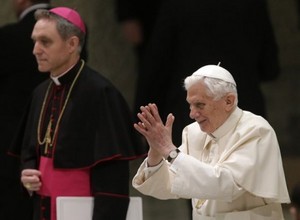
Dear brothers and sisters, as you know I decided. Thank you for your kindness. I decided to resign from the ministry that the Lord had entrusted me on April 19, 2005. I did this in full freedom for the good of the Church after having prayed at length and examined my conscience before God, well aware of the gravity of this act.
I was also well aware that I was no longer able to fulfill the Petrine Ministry with that strength that it demands. What sustains and illuminates me is the certainty that the Church belongs to Christ whose care and guidance will never be lacking. I thank you all for the love and prayer with which you have accompanied me.
I have felt, almost physically, your prayers in these days which are not easy for me, the strength which the love of the Church and your prayers brings to me. Continue to pray for me and for the future Pope, the Lord will guide us!
The catechesis the Pope offers us today...
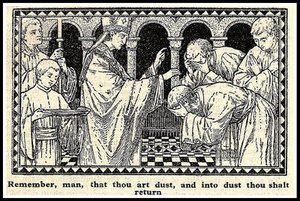
Ash Wednesday is a day of fasting (required for those between the ages of 18-59; encouraged for all others) and a day of abstinence from meat (for all aged 14 and up) it is NOT a holy day of obligation. There is no obligation to receive ashes.
What does fasting mean?
Fasting means partaking of only one full meal for the day. Two smaller meals may substitute in order not to weaken. No eating between meals.
What does abstinence mean?
The practice of abstinence is defined as not eating red meat; eggs and milk products are acceptable.
Blessed John Paul II reminded us that "While preserving their value, external penitential practices are never an end in themselves, but an aid to inner penitence, which consists of freeing the heart from the grip of sin with the help of grace, to direct it toward the love of God and our brothers and sisters."
Lenten practices: confession of sins, praying the Stations of the Cross, giving alms, doing an act of charity. Prayer, fasting, and almsgiving form one unit, to separate them makes the whole thing incoherent. Many people attend Mass more often than once a week.
"For the sake of the joy which lay before him he endured the cross, heedless of its shame" (Hebrews 12-2).
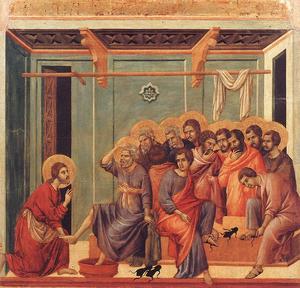
- The Apostolic Penitentiary Manuel Cardinal Monteiro de Castro, 74, does not cease working like many of the other offices of the Holy See and Vatican because the work of the Penitentiary pertains to the forgiveness of sins and matters of questions of conscience from the faithful. Sins and justice need to be forgiven. De Castro and his coworkers will remain in office.
- The Chamberlain (the Camerlengo), Tarcisio Cardinal Bertone, SDB, 78, who is the current Secretary of State, will see to the management of the temporal goods of the Church. Bills need to be made and leadership provided. He functions in this capacity during the sede vacante. Moreover, he will also head the Congregational meetings, that is, the daily meetings of the College of Cardinals discussing the needs of the Church. The cardinals will hear a "state of the Church." During the conclave, Bertone will announce the result of every ballot, ascertaining the votes required for election. Cardinal Bertone will show the new pope to the papal apartments and hand him the keys. The Chamberlain will be assisted by Bishop Giuseppe Sciacca , 57, from Catania, who functions as a legal consultant.
In his book-length interview with Peter Seewald, Light of the World, Pope Benedict responded to Seewald's question as to whether a pope should resign saying, "Yes. If a Pope clearly realizes that he is no longer physically, psychologically, and spiritually capable of handling the duties of his office, then he has a right and, under some circumstances, also an obligation to resign."
And, now Benedict has done it.
Today is the 21st observance of the World Day of Prayer for the Sick. This one paragraph of Pope Benedict's is instructive. The picks some holy people to help us see the face of Christ more clearly in the everyday. Can we be a good samaritan in the communities in which we find ourselves?
May Our Lady of Lourdes, pray for us.
For the rest of the document, see the link here.
The Year of Faith which we are celebrating is a fitting occasion for intensifying the service of charity in our ecclesial communities, so that each one of us can be a good Samaritan for others, for those close to us. Here I would like to recall the innumerable figures in the history of the Church who helped the sick to appreciate the human and spiritual value of their suffering, so that they might serve as an example and an encouragement. Saint Thérèse of the Child Jesus and the Holy Face, "an expert in the scientia amoris" (Novo Millennio Ineunte, 42), was able to experience "in deep union with the Passion of Jesus" the illness that brought her "to death through great suffering" (Address at General Audience, 6 April 2011). The Venerable Luigi Novarese, who still lives in the memory of many, throughout his ministry realized the special importance of praying for and with the sick and suffering, and he would often accompany them to Marian shrines, especially to the Grotto of Lourdes. Raoul Follereau, moved by love of neighbour, dedicated his life to caring for people afflicted by Hansen's disease, even at the world's farthest reaches, promoting, among other initiatives, World Leprosy Day. Blessed Teresa of Calcutta would always begin her day with an encounter with Jesus in the Eucharist and then she would go out into the streets, rosary in hand, to find and serve the Lord in the sick, especially in those "unwanted, unloved, uncared for". Saint Anna Schäffer of Mindelstetten, too, was able to unite in an exemplary way her sufferings to those of Christ: "her sick-bed became her cloister cell and her suffering a missionary service. Strengthened by daily communion, she became an untiring intercessor in prayer and a mirror of God's love for the many who sought her counsel" (Canonization Homily, 21 October 2012). In the Gospel the Blessed Virgin Mary stands out as one who follows her suffering Son to the supreme sacrifice on Golgotha. She does not lose hope in God's victory over evil, pain and death, and she knows how to accept in one embrace of faith and love, the Son of God who was born in the stable of Bethlehem and died on the Cross. Her steadfast trust in the power of God was illuminated by Christ's resurrection, which offers hope to the suffering and renews the certainty of the Lord's closeness and consolation.
Following Benedict XVI's announcement of his renunciation of the Petrine ministry, Father Julián Carrón, President of the Fraternity of Communion and Liberation, issued this statement:
With this gesture, as imposing as it is unexpected, the Pope witnesses to us such a fullness in the relationship with Christ that he surprises us with an unprecedented act of freedom that puts the good of the Church before all else. Thus he shows everyone that he is completely entrusted to the mysterious design of an Other.
Who would not want a freedom like this?
The Pope's gesture is a powerful reminder to renounce every human security, trusting exclusively in the strength of the Holy Spirit. It's as if Benedict XVI said to us, in St. Paul's words, 'I am confident of this, that the one who began a good work in you will continue to complete it until the day of Christ Jesus' (Phil 1:6).
Through the Pope's announcement, the Lord asks us to pierce through all appearances, going back through all of the human enthusiasm with which we greeted Benedict XVI's election and with which we have followed him in these eight years, grateful for every word of his.
We, too, desire to live the same experience of identification with Christ that dictated this historic act for the life of the Church and of the world to the Pope; and so, it is with freedom and full of wonder that we receive this extreme gesture of paternity, carried out for love of his children, entrusting his person to Our Lady so that he may continue to be our father, giving his life for the work of an Other, that is, for the edification of God's Church.
With all of our brothers and sisters, together with Benedict XVI, we ask the Spirit of Christ to assist the Church in the choice of a father who can guide her in a historic moment that is so delicate and decisive.
CL Press Office
Milan, February 11, 2013
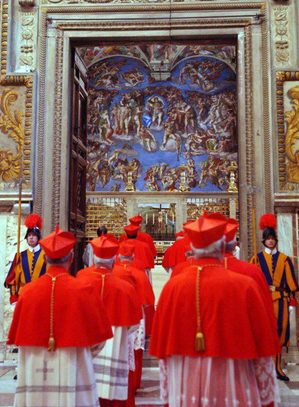
The list of cardinal-electors as of today is 118.
According to the Law of the Church, at the time that the Chair of Peter becomes vacant, those cardinals who achieve 80 years may not vote in the conclave. Pope Benedict said today that the Church is sede vacante at 8pm (Rome time) on 28 February. Therefore, Lubomyr Cardinal Husar born on 26 February 1933 becomes unable to vote in the 2013 conclave.
But observers will note that there are three cardinals who will be 80 around the time of the next conclave, a date still to be announced by Tarcisio Cardinal Bertone, Cardinal Secretary of State and the Carmerlengo.
They are:
Walter Cardinal Kasper: 5 March 1933
Severino Cardinal Poletto: 18 March 1933
Juan Cardinal Sandoval: 28 March 1933
In 2005, there were 117 cardinals (but only 115 participated in the papal election).
The oldest cardinal walking into the conclave will be Godfried Cardinal Daneels (4 June 1933), the emeritus archbishop of Mechelen-Brussel, Belgium.
The youngest cardinal will be Baselios Cleemis Cardinal Thottunkal (15 June 1959), Major Archbishop of Trivandrum, India.
The Americans in the Conclave:
Roger Cardinal Mahoney, 77
Francis Cardinal George, 76
Justin Cardinal Rigali, 77
William Cardinal Levada, 76
Sean Cardinal O'Malley, 68
Daniel Cardinal DiNardo, 63
Raymond Cardinal Burke, 64
Donald Cardinal Wuerl, 72
Timothy Cardinal Dolan, 63
Edwin Cardinal O'Brien, 73
James Cardinal Harvey, 63
The pressman for the Pope gives the timeline as we know it:
- Pope Benedict XVI has given his resignation freely, in accordance with Canon 332 §2 of the Code of Canon Law. [PAZ: "If it happens that the Roman Pontiff resigns his office, it is required for validity that the resignation is made freely and properly manifested but not that it is accepted by anyone."]
- Pope Benedict XVI will not take part in the Conclave for the election of his successor.
- Pope Benedict XVI will move to the Papal residence in Castel Gandolfo when his resignation shall become effective.
- When renovation work on the monastery of cloistered nuns inside the Vatican is complete, the Holy Father will move there for a period of prayer and reflection.
Pope Benedict XVI will be the 7th pope to have resigned his office.
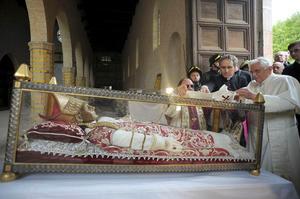
The picture shows Pope Benedict XVI placing a pallium on the casket of 13th-century Pope Saint Celestine V.
Saint Celestine V was one of the few popes who resigned or abdicated (contrary to the claim by many writers that he was the only pope to do so) in 1294.
The other popes who did so were:
- Pontian in 235
- Silverius in 537
- Martin I in 653
- John XVIII retired to a monastery in 1009
- Benedict IX abdicated in 1045 but was restored to office in 1047
- Gregory XII resigned in 1415 in an effort to end the Great Schism that split the Church from 1378 to 1417; appointed Bishop of Porto by the Council meeting in Constance.
Pope Benedict was elected on 19 April 2005: 7 years, 10 months, 10 days.
Among the popes, Benedict has served a good time, some say. In comparison:
Pope Urban VII: 13 days (1590)
Pope John Paul II: 26 years, 4 months (1978-2005)
Pope Pius IX: 31 years, 7 months, 23 days (1846-1878)
There is no one to accept Pope Benedict's resignation but God. We ought to recognize in the Benedict's intention to resign the petrine Office a profound act of humility and integrity; one can say without certainty that this is a man takes his vocation seriously so as to take such an unusual step for the good of the Church.
This morning Pope Benedict XVI announced his intention to resign the petrine office. His note of intention is dated on the feast of Saint Scholastica, the twin sister of Saint Benedict. The resignation become effective on 28 February at 8pm. He will finish paperwork and quietly retire.
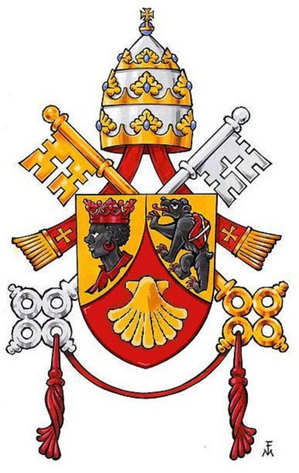 I have convoked you to this Consistory, not only for the three canonizations, but also to communicate to you a decision of great importance for the life of the Church. After having repeatedly examined my conscience before God, I have come to the certainty that my strengths, due to an advanced age, are no longer suited to an adequate exercise of the Petrine ministry. I am well aware that this ministry, due to its essential spiritual nature, must be carried out not only with words and deeds, but no less with prayer and suffering. However, in today's world, subject to so many rapid changes and shaken by questions of deep relevance for the life of faith, in order to govern the bark of Saint Peter and proclaim the Gospel, both strength of mind and body are necessary, strength which in the last few months, has deteriorated in me to the extent that I have had to recognize my incapacity to adequately fulfill the ministry entrusted to me. For this reason, and well aware of the seriousness of this act, with full freedom I declare that I renounce the ministry of Bishop of Rome, Successor of Saint Peter, entrusted to me by the Cardinals on 19 April 2005, in such a way, that as from 28 February 2013, at 20:00 hours, the See of Rome, the See of Saint Peter, will be vacant and a Conclave to elect the new Supreme Pontiff will have to be convoked by those whose competence it is.
I have convoked you to this Consistory, not only for the three canonizations, but also to communicate to you a decision of great importance for the life of the Church. After having repeatedly examined my conscience before God, I have come to the certainty that my strengths, due to an advanced age, are no longer suited to an adequate exercise of the Petrine ministry. I am well aware that this ministry, due to its essential spiritual nature, must be carried out not only with words and deeds, but no less with prayer and suffering. However, in today's world, subject to so many rapid changes and shaken by questions of deep relevance for the life of faith, in order to govern the bark of Saint Peter and proclaim the Gospel, both strength of mind and body are necessary, strength which in the last few months, has deteriorated in me to the extent that I have had to recognize my incapacity to adequately fulfill the ministry entrusted to me. For this reason, and well aware of the seriousness of this act, with full freedom I declare that I renounce the ministry of Bishop of Rome, Successor of Saint Peter, entrusted to me by the Cardinals on 19 April 2005, in such a way, that as from 28 February 2013, at 20:00 hours, the See of Rome, the See of Saint Peter, will be vacant and a Conclave to elect the new Supreme Pontiff will have to be convoked by those whose competence it is.Dear Brothers, I thank you most sincerely for all the love and work with which you have supported me in my ministry and I ask pardon for all my defects. And now, let us entrust the Holy Church to the care of Our Supreme Pastor, Our Lord Jesus Christ, and implore his holy Mother Mary, so that she may assist the Cardinal Fathers with her maternal solicitude, in electing a new Supreme Pontiff. With regard to myself, I wish to also devotedly serve the Holy Church of God in the future through a life dedicated to prayer.
From the Vatican, 10 February 2013
BENEDICTUS PP XVI
 This afternoon I watched an exceptional movie that I haven't seen in years, "Charlotte's Web," based on the 1952 famed book by the same name by E.B. White.
This afternoon I watched an exceptional movie that I haven't seen in years, "Charlotte's Web," based on the 1952 famed book by the same name by E.B. White.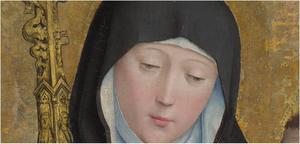
Deus, qui beátae Vírginis tuæ Scholásticæ ánimam ad ostendéndam innocéntiæ viam in colúmbæ spécie cælum penetráre fecísti: da nobis eius méritis et précibus ita innocénter vivere; ut ad ætérna mereámur gáudia perveníre.
O God, to show us where innocence leads, you made the soul of your virgin Saint Scholastica soar to heaven like a dove in flight. Grant through her merits and her prayers that we may so live in innocence as to attain to joys everlasting.
Let's pray for all Benedictines, monks, nuns, sisters and oblates.
Be sure to have enough sleep and at least have eaten one meal today before you read and give some serious consideration to what Father George Rutler, pastor of the Church of Our Saviour (NYC) has to say about the death penalty. A recent essay was published today in Crisis Magazine online.
MOST Catholics, the informed and untrained, have no idea what the Church teaches about the subject. Many will recall that Pope John Paul II taught in Evangelium vitae (1995) and that he frequently spoke against the death penalty and it was the subject of intervention when he would visit a country where the death penalty was utilized (think of his visit to Missouri). A papal encyclical doesn't change the teaching of the Church; it is however authoritative and it needs to be received. The matter of what level teaching an encyclical is, and to what degree it would bind conscience. For our purposes here, let's say that a papal encyclical is authoritative and it involves the virtue of prudence but that it doesn't contravene but it does nuance the teaching of the Church. Prudential judgment is just that, prudential. The Pope never changed the teaching of the Church. The blessed pope did try to reorient our thinking and the practice of killing legitimately convicted criminals. Remember, too, several years the heated debated between Cardinal Avery Dulles and Justice Scalia on the subject in First Things?
Father Rutler's article is helpful in giving us yet another understanding of how we might understand the death penalty. Do we actually accept Christian belief in the salvation of one's soul, that is, do we want to go to heaven? Read the article with openness, with a critical mind. As Saint Ignatius would teach, approach with the best of intentions to truly understand the other person. Knee jerk reactions are unacceptable for a Catholic who holds the integration of faith and reason. Father Rutler's argument is Catholic on all levels.
The article...
Capital punishment does not inspire roaring humor in healthy minds, so wit on the subject tends to be sardonic. Two of the most famous examples, of course, are: "In this country it is wise to kill an admiral from time to time to encourage the others," and "Depend upon it, sir, when a man knows he is to be hanged in a fortnight, it concentrates his mind wonderfully."
The first, "pour encourager les autres," is in "Candide" where Voltaire alludes to the death by firing squad of Admiral John Byng in 1757 for having let Mincorca fall to the French. The second was Samuel Johnson's response to the hanging of an Anglican clergyman and royal chaplain William Dodd for a loan scam. Byng's death was the last instance of shooting an officer for incompetence, while Dodd's was the last hanging at Tyburn for forgery. Dodd's unsuccessful appeal for clemency was ghostwritten by Dr. Johnson.
In Los Angeles Archbishop José Gomez's weekly column for today's edition of Los Angeles weekly newspaper, The Tidings, he dedicates time to what we ought to make time for in Lent. Given the recent events in LA with the retired cardinal and auxiliary bishop, His Excellency's words hit home, or at least they ought to. What is clear to me is that we can't settle for following Jesus "half way" and "good enough" is not, in fact enough. The life we lead, our spiritual life, the friendship we share needs constant review and a constant infusion of grace. Gomez starts us on the path to ask, Am I leading the right kind of Christian life? The column, emphasis mine:
These have been challenging days for our local Church here in Los Angeles.
I have been talking and reflecting with Cardinal Mahony and Bishop Curry, along with our other Auxiliary Bishops about the events of last week. We are committed to moving forward in our ministries with hope and confidence in God's grace.
We need to keep praying for those who are hurting. We need to ask again for forgiveness for the sins of the past and for our own failings. And we need to match our prayers for grace with concrete actions of healing and renewal.
And recent events should inform our prayer, penance and charity in this season of Lent, which begins next week with Ash Wednesday.
One of the most intriguing and beautiful faces of holiness in the 20th century is Saint Josephine Bahkita (c. 1869- 8 Feb 1947), the Sudanese woman once a slave, convert, and a religious sister. She's gaining popularity and was mentioned by the Pope in Spe Salvi.
Not long ago I watched a most beautiful film, "Bakhita: From Slave to Saint." It was exemplary in the way the directors brought out the beauty of conversion for Bakhita but also for others, including the Canossian sisters and the parish priest.
I can't recommend the movie enough even with the subtitles.
In a 1993 homily Pope John Paul II said of Bakhita:
In the midst of so much hardship, Blessed Bakhita is your model and heavenly patron. In the terrible trials of her life Bakhita always listened to Christ's word. She learned the mystery of his Cross and Resurrection: the saving truth about God who so loved each one of us that he gave his only Son (Cf. Jn. 3: 16), the saving truth about the Son who loves each one of us to the end (Cf. ibid. 13: 1).
Pope Pius IX (13 May 1792-7 February 1878), in history known as Giovanni Maria Mastai-Ferretti, was the longest-reigning Roman Pontiff in the history of the Catholic Church, serving from 16 June 1846 until death, nearly 32 years.
The future pope was the archbishop of his hometown of Spoleto and later of Imola. Personal attributes related show him to be known for his charitable work among the poor, care for educating his people and the formation of clergy; he had a keen intellect, prayerful, was friendly and engaging. He was an advocate of making administrative changes in the Papal States. He was a cardinal in pectore in 1839 and later revealed in 1840.
Following the death of Gregory XVI, Ferretti was elected pope in 1846 with neither diplomatic nor curial experience, a source of great tension for some.
Pope Pius convened the First Vatican Council in 1869, defined the dogma of the Immaculate Conception of the Blessed Virgin Mary, and granted the Marian title of Our Mother of Perpetual Help, a famous Byzantine icon from Crete entrusted to the Redemptorist priests which now hangs in their church on the Via Merulana. He was the "Marian Pope."
Pius IX was also the last pope to rule as the Sovereign of the Papal States, which fell to Italian nationalists by 1870 and were incorporated into the Kingdom of Italy.
Thereafter, Pius became the first "Prisoner of the Vatican." Pius is also the origin of the collection taken annual called the "Peter's Pence."
Pope Pius IX was beatified in 2000.
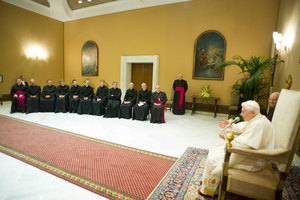
At the end of the Pope's General Audience on Wednesday, 6 February, Benedict XVI received in the Paul VI Hall the participants of the 12th General Assembly of the Fraternity of Saint Charles Borromeo. They had just elected a new Superior General, Father Paolo Sottopietra, 45. Father Sottopietra is the second Superior General following the founder and Superior General the Most Reverend Massimo Camisasca who was ordained bishop for the Diocese of Reggio Emilia on 7 December. Camisasca served as the leader for 27 years. The Fraternity developed from the charism of the Servant of God Father Luigi Giussani and the ecclesial movement Communion and Liberation.
Present at the papal audience were Bishop Massimo Camisasca, FSCB and Father Julián Carrón.
The Holy Father's address
It gives me great joy to be with you. I remember well my visits to Palazzo Borromeo, next to St. Mary's Major Basilica, where I personally met Fr. Giussani; I have known his faith, his joy, his strength and the richness of his ideas, the creativity of his faith. A true friendship developed between us; and so, through him I got to know even better the community of Communion and Liberation.
And I am glad that his successor is with us, who continues this great work and inspires so many people, so many lay people, men and women, priests and laity, to collaborate in spreading the Gospel and the growth of the Kingdom of God. And among you I have also had the opportunity to get to know Massimo Camisasca; we have talked about different things; I have gotten to know his creativity in art, his ability to see, to interpret the signs of the times, his great gift as a teacher, a priest. I once even had the honor to ordain some priests in Porto Santa Rufina, and it was nice to know that here a new Priestly Fraternity is arising in the spirit of St. Charles Borromeo, who always remains the great model of a Pastor who is truly stimulated by the love of Christ, who seeks out the small, who loves them and so truly creates faith and builds up the Church.
Now your Fraternity is large, and it is a sign that there are vocations. But there is also a need to be open to finding, accompanying, guiding and helping vocations mature. This is the thing for which I thank Don Camisasca, who has been a great educator. And today, education is always important to the growth of the truth, for us to grow in our status as children of God and brothers of Jesus Christ.
Now, thanks be to God, I have also known for a long time your new Superior General, who has also been in touch somewhat with my theology. So, I am glad that I can be spiritually and intellectually with you and that we can offer fruitful help to each other through our work.
May the Lord bless you all. I thank the Lord for this gift of your Fraternity: may it grow and deepen always, even more in the love of Christ, in the love of men for Christ. The Lord accompanies you.
Pictures of the meeting with Pope Benedict
Theologians are after divine truth and not mere human opinions. There is a danger and a difficulty about this point. We are in danger of modern disregard of theology. . . . The danger nowadays is overemphasis on non-intellectual elements. This means a kind of treachery to the truth. It used to be assumed that man is a reasonable animal. The modern idea seems to be that man is first and foremost a creature with a heart. I am not prepared, however, to give up my reason in connection with the things of God.
Father Georges Florovsky
Remarks made at the Second World Conference on Faith and Order
Edinburgh, August 4, 1937
Is Father Florovsky correct in his perception? I tend to think so....
The Franciscan Friars of the Renewal are launching a video hoping to make 1 Million Hits for Life!
Please view the video and share with your friends.
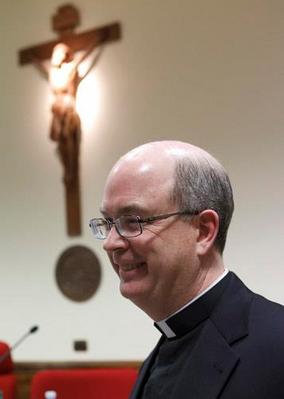 Father Robert W. Oliver, a priest from Boston began his new work --a ministry of justice-- as the new Promoter of Justice at the Congregation for the Doctrine of the Faith on February 1.
Father Robert W. Oliver, a priest from Boston began his new work --a ministry of justice-- as the new Promoter of Justice at the Congregation for the Doctrine of the Faith on February 1.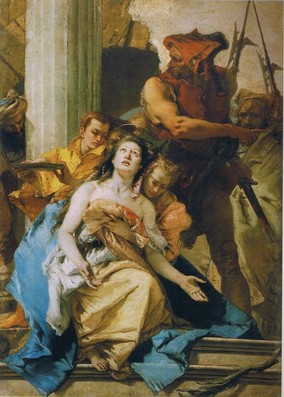 May the Virgin Martyr Saint Agatha implore your compassion for us, O Lord, we pray, for she found favor with you by the courage of her martyrdom and the merit of her chastity.
May the Virgin Martyr Saint Agatha implore your compassion for us, O Lord, we pray, for she found favor with you by the courage of her martyrdom and the merit of her chastity.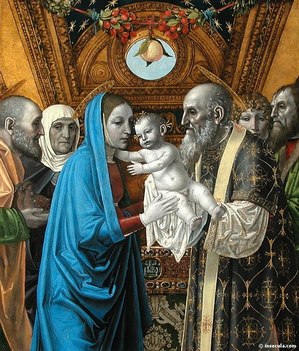
We are 40 days away from the Nativity of the Lord. The Presentation of the Lord is a feast the Church in the Eastern part of the ecclesial world, known as an "Encounter," a second epiphany of the new born King and Messiah given the words of the Simeon. Christ is identified as the Light of the Nations.
The Christology of the Liturgy is quite clear and instructive: by no other person is salvation possible. By the same token this Light to the Nations is a supreme sign of contradiction (St Cyril of Jerusalem) and a stumbling block (St Paul)
The feast began to observed in the 6th. The Western Church made this feast more penitential because it began to be linked with the purification of Mary according to the Mosaic law.
In the Missal of Blessed John XXIII today ends the Christmas season whereas in the Missal of Paul VI the feast of the Baptism of the Lord ends Christmas.
Our liturgical observance of the Lord's Presentation is also called "Candlemas" because the Church blesses candles, all the candles to be used in the Mass, including the Paschal Candle to be used at the Easter Vigil; home candles are also brought to church for this blessing. Besides the special prayers prayed, Simeon's song Nunc dimittis, Saint John of Damascus' song Adorna thalamum tuum, Sion AND Zacharia's Benedictus are sung by the choir. Christ as the light of the world is not merely a theological statement, it is a reality in the life of the Christian. To what end do we reflect the light of Christ in the home, in the workplace, in social settings?
V. Zion, let your wedding chamber be prepared to receive Christ your King.
R. The Virgin conceived and gave birth to a son, yet she remained a virgin for ever. She knelt in worship before her child.
V. Simeon took the child in his arms and gave praise and thanks to God.
R. The Virgin conceived and gave birth to a son, yet she remained a virgin for ever. She knelt in worship before her child.
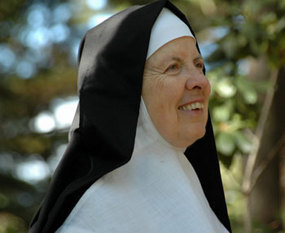
Yesterday, Reverend Mother Catherine of Alexandria, 73, nun of the Abbey of Regina Laudis, made her transitus to the Lord. Mother Catherine's death follows a long illness.
The Mass of Christian Burial is scheduled for 2 February 2013, 10am.
May Mother Catherine's memory be eternal.
Her very fascinating biography...
Reverend Mother Catherine of Alexandria (née Kathleen Janet) Talbot, 73, member of the Abbey of Regina Laudis, died at the Abbey on Thursday, January 31, 2013, Feast of Saint John Bosco, after a long illness. She had been manager of the Monastic Art Shop for over twenty years and was devoted to the many volunteers who staff the Art Shop. A chemist by profession, Mother Catherine brought that training to her work in the Abbey herb gardens and as Administrator of the Abbey herb department, known as La Reine de Saba (Queen of Sheba). She created many herbal preparations and perfumes, including the "St. Cecilia" chrism fragrance. She brought her gift for administration to the Financial Office of the Abbey, a work to which she was committed for many years even during the final period of her illness.
Archbishop Louis Sako, 64, who since 2003 and until now the archbishop of Kirkuk, Iraq, has been elected the new Patriarch of Babylon, and the archbishop of Baghdad. He is XX worldwide leader of the Chaldean Catholic Church.
Sako was elected this week by the Synod of the Chaldean Church, 15 bishops, which has been meeting in Rome this week to discuss the church life and to elect a successor to Patriarch Emmanuel III Delly who retired on 19 December 2012. Pope Benedict XVI quickly granted his request for full ecclesiastical communion, according to the Code of Canons for the Eastern Churches.
Patriarch Louis Raphael I Sako is the point of unity among Chaldean Catholics and with the Bishop of Rome. His work will be to clearly preserve the life of the Chaldean Church, but also to chart the future of the ancient Christian community
The new Patriarch is a native of Mosul, Iraq, ordained to the priesthood in 1974. He earned two doctorates--first in Patristics at the Jesuit-run Pontifical Oriental Institute in Rome, and the second in history at the Sorbonne, Paris. Sako did pastoral work in Mosul and was the rector of the Patriarchal Seminary in Baghdad for 5 years prior to being ordained as the archbishop of Kirkuk on 14 November 2003. He is a published author and speaks several languages.
An interview with Vatican Radio.
Rome Reports has a brief news piece.
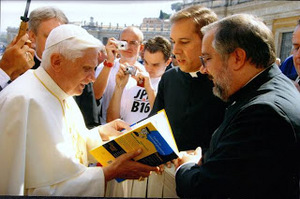
A Four Day Lenten Mission to help discover the truth and beauty of the Catholic Faith
Rev. John Trigilio & Rev. Ken Brighenti
Co-Hosts of EWTN Program "Web of Faith 2.0"
Co-Authors of Catholicism for Dummies
February 25-28, 2013 at 7 PM each night
355 Foxon Road (Rt.80) East Haven, CT
An abridged presentation will also be given each morning at Saint Augustine Church, 30 Caputo Road, North Branford, following the 9 a.m. Mass.
